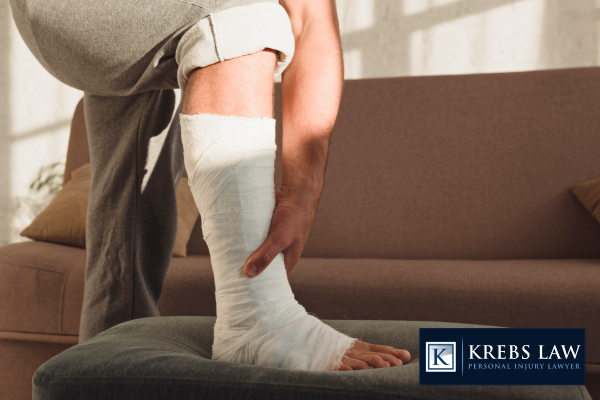This page was written, edited, reviewed & approved by JR Krebs following our comprehensive editorial guidelines. JR Krebs, the Founding Partner, has years of legal experience as a bankruptcy attorney. Our last modified date shows when this page was last reviewed.

When someone gets hurt because of another person's actions or negligence, they may have the right to file a personal injury claim. This process involves legally pursuing compensation for the harm suffered. Such claims are important for covering medical bills, lost wages, and other related costs that arise from the injury.
Knowing how personal injury claims work can help victims start their recovery journey on a solid footing. Krebs Law is here to help you along the way.
A personal injury claim aims not just to recover financial losses but also to hold the responsible party accountable for their actions. Working with a skilled personal injury lawyer can improve your chances of receiving a fair settlement. Knowing the different types of personal injury cases and the steps involved in making a claim is important.
Personal injury claims are legal disputes that happen if one person is harmed by an accident or injury, and someone else could be legally responsible for that damage. The legal system lets the injured person be compensated financially through a settlement or a court judgment.
But the process for achieving this compensation requires a clear awareness of personal injury law. This includes proving liability, evaluating damages, and negotiating settlements.
Navigating a personal injury claim involves several key components, from documenting injuries to dealing with insurance companies. The initial steps include gathering evidence, such as medical records and witness statements, which are vital for building a strong case.
An experienced personal injury lawyer is vital, providing the guidance needed to manage negotiations effectively or, if needed, litigate the case in court. Awareness of these steps and preparing accordingly can highly impact the outcome of a claim.


To succeed in a personal injury claim, you must establish that someone else was negligent and that their negligence caused your injury. Negligence indicates that someone did not act reasonably, leading to harm.
Establishing liability involves proving that this negligence directly resulted in your injuries. For instance, in a car accident case, you must show that the other driver violated traffic laws or drove recklessly.
In addition to proving negligence, you must also link the responsible party's actions directly to your injuries. This often involves detailed evidence, including medical records and expert testimony.
Demonstrating the connection between the negligence and the harm suffered is needed for a successful claim. Personal injury lawyers are adept at gathering and presenting this evidence effectively.
In personal injury law, the concept of 'duty of care' covers the responsibility one individual has to avoid causing harm to another. Everyone has some level of duty of care towards others.
For example, drivers have a duty to follow road rules and operate their vehicles safely. When someone fails to fulfill this duty, it's considered a breach. Once a breach of duty is shown, it must be proven that this breach directly led to the injury. This link is essential for the claim to hold up in legal proceedings.
Lawyers help by gathering the needed proof, such as surveillance footage, witness statements, and expert assessments, to demonstrate how the breach of duty led to the injury.

Filing a personal injury claim involves several important steps. Initially, you must gather all relevant evidence, including medical records and witness testimonies. This information supports your claim about how the accident happened and details the extent of your injuries. Submitting this evidence to the insurance company is the first step in negotiating a settlement.
Submitting an insurance claim is always the first step in seeking compensation after an injury. This involves negotiating with the insurance company to cover your medical bills and other losses. But if the insurance does not offer a fair settlement, you may need to file a lawsuit to seek adequate compensation.
Filing a lawsuit can lead to a more substantial payout but is more complex and time-consuming. It involves presenting your case in court, potentially in front of a jury. Your lawyer will draft all required documentation and represent you throughout the court proceedings, arguing your case and presenting evidence.
Evidence and documentation are the backbones of any personal injury claim. They provide the factual basis needed to support your case. Medical records, pictures of the incident location, and witness statements all contribute to proving your claim.
It is important to have a detailed record of your injuries and related expenses. This documentation supports your claim and helps your attorney negotiate a better settlement. Accurate and comprehensive evidence can make or break your claim.
Tabulating damages in a personal injury case involves assessing economic and non-economic losses. Economic damages include direct financial losses such as medical expenses and lost pay. Non-economic damages cover emotional distress, loss of enjoyment of life, and emotional distress.
The total damages figure aims to compensate the injured person for how the injury has affected their life. Lawyers use this calculation to argue for a fair settlement or court award. This process often involves expert testimony and detailed documentation.

Negotiating a personal injury settlement involves a detailed awareness of the law and your case's specifics.
Your attorney will use the evidence and documentation gathered to argue for a settlement that covers all your costs and compensates for your pain and suffering. This process often involves back-and-forth negotiations with the insurance company.
A successful negotiation results in an agreement where you receive a lump sum or structured payments. If negotiations fail, however, your case may need to go to trial. In this instance, your attorney's preparation will be needed for presenting a strong case in court.
Taking a claim to trial may be needed if the insurance company's settlement offers are insufficient and do not cover all your losses and damages.
A trial allows you to present your case in detail to a judge or jury, which can result in a fairer, more comprehensive compensation package. But it's important to consider the additional time and costs of a trial and the unpredictability of a court decision.
If the insurer contests the severity of your injuries or the facts of the case and mediation or arbitration fails to resolve these issues, going to trial might be your best option.
Your personal injury lawyer will help you decide the strength of your case and the likelihood of success in court. They will prepare all the required evidence and arguments to present a compelling case to the jury. Let us handle your personal injury lawsuit.

At Krebs Law, our Tuscaloosa personal injury attorney is here to fight for you. We advocate for fair and just personal injury settlements for all of our clients. The personal injury claim process is complicated, so rely on an experienced personal injury attorney to fight for you. Contact us today to schedule a free case consultation.

J.R. is dedicated to providing personalized representation, avoiding a one-size-fits-all approach. He tailors his strategy to the unique challenges and needs of each client and case, ensuring focused and individualized attention.
His practice mainly covers Plaintiff’s Personal Injury, including car and 18-wheeler accidents, slips and falls, dog bites, defective products, and wrongful death. He also handles commercial disputes on contingency, with experience in contracts, construction, and probate. For any dispute headed toward litigation, J.R. develops an aggressive strategy to maximize your recovery through negotiation, arbitration, or trial.
"*" indicates required fields